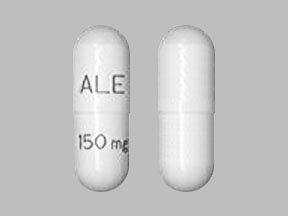Alecensa Disease Interactions
There are 5 disease interactions with Alecensa (alectinib).
Alectinib (applies to Alecensa) bradycardia
Moderate Potential Hazard, Moderate plausibility. Applicable conditions: Arrhythmias
Cases of bradycardia have been reported in patients treated with alectinib. It is recommended to monitor heart rate and blood pressure regularly. Dose modification is not required in cases of asymptomatic bradycardia. In cases of symptomatic bradycardia that is not life-threatening, withhold therapy until recovery to asymptomatic bradycardia or to a heart rate of 60 bpm or above and evaluate concomitant medications known to cause bradycardia, as well as anti-hypertensive medications. If attributable to a concomitant medication, resume alectinib at a reduced dose upon recovery to asymptomatic bradycardia or to a heart rate of 60 bpm or above, with frequent monitoring as clinically indicated. Permanently discontinue alectinib in case of recurrence. Permanently discontinue alectinib in cases of life-threatening bradycardia if no contributing concomitant medication is identified.
References
- (2015) "Product Information. Alecensa (alectinib)." Genentech
Alectinib (applies to Alecensa) hepatic impairment
Moderate Potential Hazard, Moderate plausibility. Applicable conditions: Liver Disease
No dose adjustment is recommended for patients with mild hepatic impairment. It is recommended to monitor liver function tests including ALT, AST, and total bilirubin every 2 weeks during the first 3 months of treatment, then once a month and as clinically indicated, with more frequent testing in patients who develop transaminase and bilirubin elevations. It might be necessary to withhold therapy and resume at a reduced dose, or permanently discontinue treatment based on the severity of the adverse events. Care should be exercised when using alectinib in patients with moderate or severe hepatic impairment as its safety has not been studied in these patients.
References
- (2015) "Product Information. Alecensa (alectinib)." Genentech
Alectinib (applies to Alecensa) myalgia
Moderate Potential Hazard, Moderate plausibility. Applicable conditions: Myopathy
Elevations of Creatine Phosphokinase (CPK) have been reported with the use of alectinib. It is recommended to watch closely for signs and symptoms of CPK elevation and to advise patients to report any unexplained muscle pain, tenderness, or weakness. Assess CPK levels regularly as clinically indicated in patients reporting symptoms. Based on the severity of the CPK elevation, withhold therapy and then resume or reduce dose.
References
- (2015) "Product Information. Alecensa (alectinib)." Genentech
Alectinib (applies to Alecensa) renal impairment
Moderate Potential Hazard, Moderate plausibility. Applicable conditions: Renal Dysfunction
No dose adjustment is recommended for patients with mild or moderate renal impairment. Care should be exercised when using alectinib in patients with severe renal impairment or end-stage renal disease as its safety has not been studied in these patients.
References
- (2015) "Product Information. Alecensa (alectinib)." Genentech
Multikinase inhibitors (applies to Alecensa) lung toxicity
Moderate Potential Hazard, Moderate plausibility. Applicable conditions: Interstitial Pneumonitis, Pulmonary Impairment
The use of certain multikinase inhibitors has been associated with pulmonary toxicity. Serious cases of interstitial lung disease (ILD), including fatal cases and interstitial pneumonitis or pulmonary fibrosis have been reported. Caution is recommended when using these agents in patients with a history of interstitial pneumonitis or pulmonary fibrosis or those patients presenting with acute onset of new or progressive unexplained pulmonary symptoms such as dyspnea, cough, and fever pending diagnostic evaluation. If ILD is confirmed, these agents should be permanently discontinued and appropriate measures should be instituted. Treatment should be immediately withheld in patients diagnosed with ILD/pneumonitis and permanently discontinued if no other potential causes of ILD/pneumonitis have been identified.
References
- (2011) "Product Information. Vandetanib (vandetanib)." Astra-Zeneca Pharmaceuticals
- (2011) "Product Information. Zelboraf (vemurafenib)." Genentech
- (2013) "Product Information. Mekinist (trametinib)." GlaxoSmithKline
- (2014) "Product Information. Zykadia (ceritinib)." Novartis Pharmaceuticals
- (2014) "Product Information. Zydelig (idelalisib)." Gilead Sciences
- (2015) "Product Information. Alecensa (alectinib)." Genentech
Alecensa drug interactions
There are 99 drug interactions with Alecensa (alectinib).
Alecensa alcohol/food interactions
There is 1 alcohol/food interaction with Alecensa (alectinib).
More about Alecensa (alectinib)
- Alecensa consumer information
- Check interactions
- Compare alternatives
- Pricing & coupons
- Reviews (2)
- Drug images
- Side effects
- Dosage information
- Patient tips
- During pregnancy
- FDA approval history
- Drug class: multikinase inhibitors
- Breastfeeding
- En español
Related treatment guides
Drug Interaction Classification
| Highly clinically significant. Avoid combinations; the risk of the interaction outweighs the benefit. | |
| Moderately clinically significant. Usually avoid combinations; use it only under special circumstances. | |
| Minimally clinically significant. Minimize risk; assess risk and consider an alternative drug, take steps to circumvent the interaction risk and/or institute a monitoring plan. | |
| No interaction information available. |
Further information
Always consult your healthcare provider to ensure the information displayed on this page applies to your personal circumstances.


